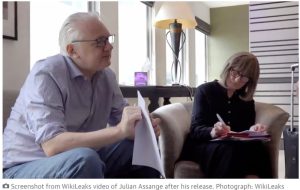Clive Stafford Smith guardian.co.uk, Wednesday 10 February 2010
>
> In a scathing judgment running to 84 pages, the court of appeal has
> slapped the government down in the case of Binyam Mohamed. As many
> will recall, Mohamed was seized by the Pakistanis in April 2002,
> turned over to the Americans for a $5,000 bounty, abused for three
> months, rendered to Morocco, tortured with razor blades to the
> genitals, rendered on to the "Dark Prison" in Kabul, tortured some
> more, and then held for five years without charge or trial in Bagram
> air force base and Guantánamo Bay. The verdict of the court –
> comprised of three of the country’s most senior judges – underlines
> the shameful way in which, in this case and beyond, our political
> leaders have placed their desire to suppress embarrassing revelations
> above the welfare of citizens.
>
Clive Stafford Smith: ‘The government is still trying to suppress evidence’
With Mohamed’s torture established as a judicial fact, the judges queried what reason there could be to cover up the now-notorious "seven paragraphs"? This summary was removed from the original opinion when the government cried national security. The material is important – it adds direct evidence that the Americans wrote down their torture tactics, and that a British agent knew Mohamed was being abused before he flew to Pakistan to join the interrogation – but represents only a few crumbs of the overall
criminal enterprise.
>
> Yet two years into the litigation, the foreign secretary, David
> Miliband, still argued that a court would be "irresponsible" to reveal
> the material – strong language when aimed by the diplomatic service at
> the judicial branch.
>
> "No advantage is achieved by bandying deprecatory epithets," the
> judges replied, before passing out a few polite insults themselves.
> The foreign secretary’s intransigence was "irrational" and lacking in
> "commonsense". With the original high court judges, that makes five
> independent members of the judiciary against one US-dependent
> politician.
>
> So what is truly at stake? At its most significant level, the decision
> focused on a legacy of the "war on terror" that is more bitter even
> than abusing prisoners: the conflation of national security with
> political embarrassment. The fact of torture is horrific; but the
> concerted effort of British and American officials to cover up the
> torturers’ crimes is far more insidious. How can we learn from
> history, and avoid repeating mistakes, if we do not know what that
> history is?
>
> This is a high-profile example of a national disease. Because we fear
> for our safety and cherish our privacy, politicians argue that we will
> lose both if we do not sacrifice our right to free speech, our "right
> to know". We should, in other words, simply trust them.
>
> This is the path that British politicians have been treading all too
> frequently. Nobody would have known that three Labour MPs committed
> expense fraud, or that scores of others spent money on the ethical
> equivalent of a duck pond, if we were only allowed to see the redacted
> version of the MPs expenses. The claim in that case was "privacy".
>
> The seven paragraphs should rate little more than a footnote in the
> full story, yet that is a tale that remains untold. The court tells us
> that a "vast body" of government reports about Mohamed’s abuse remain
> secret. I was in Washington last week reviewing a similarly "vast
> body" of evidence indicating British complicity in the abuse of
> another Guantánamo prisoner, *Shaker Aamer. Not a word of that has
> been revealed, again on grounds of national security.
>
> Since I am not as temperate as a judge, I would not characterise the
> arguments made by Miliband as "irrational": after beginning with the
> term "foolish," I fear I would descend to epithets unfit to publish
> here . Suppressing any evidence of government criminality on grounds
> of national security sets a very dangerous precedent. As the saying
> goes, those who would sacrifice their freedoms to ensure their safety
> deserve neither – and can expect to lose both.
Clive Stafford Smith guardian.co.uk, Wednesday 10 February 2010
>
> In a scathing judgment running to 84 pages, the court of appeal has
> slapped the government down in the case of Binyam Mohamed. As many
> will recall, Mohamed was seized by the Pakistanis in April 2002,
> turned over to the Americans for a $5,000 bounty, abused for three
> months, rendered to Morocco, tortured with razor blades to the
> genitals, rendered on to the "Dark Prison" in Kabul, tortured some
> more, and then held for five years without charge or trial in Bagram
> air force base and Guantánamo Bay. The verdict of the court –
> comprised of three of the country’s most senior judges – underlines
> the shameful way in which, in this case and beyond, our political
> leaders have placed their desire to suppress embarrassing revelations
> above the welfare of citizens.
>
Clive Stafford Smith: ‘The government is still trying to suppress evidence’
With Mohamed’s torture established as a judicial fact, the judges queried what reason there could be to cover up the now-notorious "seven paragraphs"? This summary was removed from the original opinion when the government cried national security. The material is important – it adds direct evidence that the Americans wrote down their torture tactics, and that a British agent knew Mohamed was being abused before he flew to Pakistan to join the interrogation – but represents only a few crumbs of the overall
criminal enterprise.
>
> Yet two years into the litigation, the foreign secretary, David
> Miliband, still argued that a court would be "irresponsible" to reveal
> the material – strong language when aimed by the diplomatic service at
> the judicial branch.
>
> "No advantage is achieved by bandying deprecatory epithets," the
> judges replied, before passing out a few polite insults themselves.
> The foreign secretary’s intransigence was "irrational" and lacking in
> "commonsense". With the original high court judges, that makes five
> independent members of the judiciary against one US-dependent
> politician.
>
> So what is truly at stake? At its most significant level, the decision
> focused on a legacy of the "war on terror" that is more bitter even
> than abusing prisoners: the conflation of national security with
> political embarrassment. The fact of torture is horrific; but the
> concerted effort of British and American officials to cover up the
> torturers’ crimes is far more insidious. How can we learn from
> history, and avoid repeating mistakes, if we do not know what that
> history is?
>
> This is a high-profile example of a national disease. Because we fear
> for our safety and cherish our privacy, politicians argue that we will
> lose both if we do not sacrifice our right to free speech, our "right
> to know". We should, in other words, simply trust them.
>
> This is the path that British politicians have been treading all too
> frequently. Nobody would have known that three Labour MPs committed
> expense fraud, or that scores of others spent money on the ethical
> equivalent of a duck pond, if we were only allowed to see the redacted
> version of the MPs expenses. The claim in that case was "privacy".
>
> The seven paragraphs should rate little more than a footnote in the
> full story, yet that is a tale that remains untold. The court tells us
> that a "vast body" of government reports about Mohamed’s abuse remain
> secret. I was in Washington last week reviewing a similarly "vast
> body" of evidence indicating British complicity in the abuse of
> another Guantánamo prisoner, *Shaker Aamer. Not a word of that has
> been revealed, again on grounds of national security.
>
> Since I am not as temperate as a judge, I would not characterise the
> arguments made by Miliband as "irrational": after beginning with the
> term "foolish," I fear I would descend to epithets unfit to publish
> here . Suppressing any evidence of government criminality on grounds
> of national security sets a very dangerous precedent. As the saying
> goes, those who would sacrifice their freedoms to ensure their safety
> deserve neither – and can expect to lose both.






